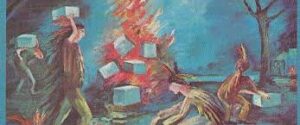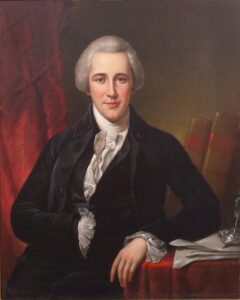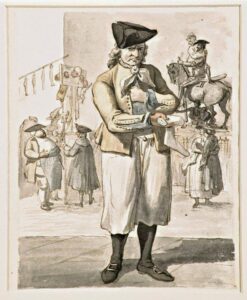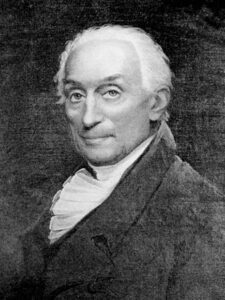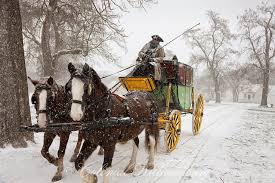Americanism Redux
January 9, Your Today, 250 Years Ago, In 1775
A thing happens twice.
* * * * * * *
(the overnight act)
One is first, real and experienced as a direct, right-now, and first-hand fact. “I see that.” Two is second, as in reported in viewing (read or watched) or listening (heard) and experienced as indirect and second-hand fact, second-layer fact, second-ring-out fact. “Someone told me they saw that.”
Thus, in various senses and tenses, a thing happens twice, in the actual moment of reality and again in the instant of retelling and recalling.
As a real and experienced thing, a little over two weeks ago, in the colony of New Jersey’s Cumberland County, tea shipped from Holland was seized and stored in the town of Greenwich. The local “Committee of Observance”, enforcers of the new economic boycott, had taken the step in compliance with anti-imperial efforts. To the surprise of almost everyone, the next day revealed that overnight someone had entered the storehouse and destroyed the tea. The Committee met hastily to draft and approve resolutions that disapproved of the unsanctioned aggressiveness and potential violence embodied in the tea’s destruction. This was the direct, first-hand thing, the actual experience.
Then, a fortnight later, making it today, 250 years ago, on January 9, readers (or listeners of oral readings) of the “Pennsylvania Packet” newspaper learned of the incident for the first time. They absorbed the event indirectly through this second-hand report.
The twice-happened thing is a continuous part of living and lived life, of reality. An experience is immediate, and then the experience is re-experienced through telling, showing, and so on.
The question is, crucially, are all twice-happened things of the same nature? Do they convey the same meaning? Do they head toward the same direction?
All of the twice-happened things in early 1775 have begun their descent into the grip of winter.
* * * * * * *
(weighty topics)
People are writing about the biggest, broadest, most vast topics imaginable by today, 250 years ago. They’re writing about life and death. That’s how elemental and foundational the imperial-colonial crisis has become by January 9, 1775.
The writer taking on the subject of life is Daniel Leonard, a lawyer in the colony of Massachusetts. With the public name of Massachusettensis, he writes in a widely read essay that people form government for “security from…internal rapacity, violence…and foreign invasion.” That’s what they expect from government, to prevent these things so they can live life. In so doing, he continues, it is impossible that two centers of power can exist in the same government—can’t have two, never have two, won’t do two. So, the power of British government resides in England…or somewhere else. No other way to do it. Also, Leonard/Massachusettensis writes that perhaps the one central position of power can change over time, can physically move from one spot to another. Perhaps to America one day? Maybe, he says. And if that happens, he concludes, “some future George” may “take the sceptre” and rule in America with an American Parliament. That’s how life works, according to Leonard.
But what about death? Well, that’s the subject tackled today, 250 years ago by a different writer, British military officer Charles Lee, a consultant who has been advising some of the colonial legislatures on military defense planning. Lee’s essay, making the rounds today in several newspapers like the “South Carolina Gazette”, urges readers to recognize the truth of the military situation: a British military force seeking to punish the colonies won’t succeed, it can’t kill you, you won’t die from conquest by Redcoats. Lee explores all the reasons that, in his view, give the military advantage to supporters of colonial rights. If any armed force can inflict death on an opponent, it will be our own, asserts Lee.
The snow and ice of winter in early 1775 are backdrops for writing about some of the most basic issues of people and humanity. What forms a government? What are the odds of death? Leonard and Lee write not to debate or discuss but to stake out clear positions from which to act.
* * * * * * *
(modern York, Maine)
He’s in full and fine voice today, isn’t he?
70-year old Daniel Bragdon stands in front of a York town meeting, today, 250 years ago, and gives the crowd everything he’s got. The captain, a title from the French and Indian War, showers his listeners with details, themes, big picture, real drama, hand and facial gestures, eye contact, passion, and reason. He stays on point and hits on target, with not even an inch of space or second of time in separation—we the people, the townspeople of York, must, must, must put the new economic boycott into effect! For the sake of our colony of Massachusetts (later, Maine) and our fellow colonists up and down the Atlantic Coast, we must!!
Well then, okay, after his “haranguing,” he’s got their vote. The crowd selects him to be one of York County’s delegates to the next Massachusetts Provincial Assembly, the upstart legislative body organized to provide at least a semblance of government, law, and order in this revolutionary circumstance.
Collectively, members of the Massachusetts Provincial Assembly are, to most colonists in York, a thin barricade between a life with ordinary tension and a life with revolutionary chaos and upheaval. So much hangs in the balance as to whether the barricade can hold up under the current pressure of events. Will this community sink into utter lawlessness?
Words have gotten Bragdon chosen to put his shoulder to the barricade. Actions will determine if it was a wise choice.
Towns in the colonies of New Jersey, New Hampshire, and New York have similar meetings.
* * * * * * *
(Bradford as an older man)
The mind of 19-year old William Bradford is running backward and forward this week. He’s been studying for a legal career, meeting regularly with one of the most well-known lawyers in his home city of Philadelphia in the colony of Pennsylvania. The law books seem dusty to him, all dull and lifeless.
Instead, Bradford draws his energy and zeal from the dispute between the British colonies and the imperial government in England.
Bradford thinks back just a few months ago to the Continental Congress that met in Philadelphia. He laments the secrecy of the meetings. He doesn’t know as much as he’d like about the leadership qualities of the attending delegates. He boils it down to place—the Virginians have gained a reputation of courage and forthrightness, the New Yorkers are greedy, unreliable, and indeed (some of them) are pushing back in favor of British imperial rule, while the Pennsylvanians suffer from too much influence by Quakers and pacificism.
He worries over something he just heard said at the next table over in a coffee shop. A man with a newspaper read aloud a report from England. It seems that if the colonies attempt to break away from the British Empire, some British policymakers are ready to call for enslaved people to rise up and attack their enslavers. That’s what the report maintains, at least. Is that where the struggle is going?
The question terrifies Bradford.
* * * * * * *
The ideas and the emotions boil and flow inside a body that, for this season, the cold has frozen at the edges. Everyone knows that weeks of winter remain. But then what? What will happen when the thaw comes?
Also
(one of his advisors)
“The affairs of America are now come to a crisis, and as the consideration will be taken up by both Houses of Parliament, immediately after the holidays, it cannot but be the wish of every candid and unprejudiced person; that the proceedings of the General Congress (in Philadelphia) had been of such a valor and complexion as to have invited accommodation, without provoking the vengeance of the mother country.”
These are the words of an advisor to British King George III.
* * * * * * *
(a British merchant)
Several British towns are the sites of meetings hurriedly called by men whose businesses rely on trade in the American colonies. They’re busy drafting one-page statements that will be sent to Parliament and the King’s advisors. They want changes made to the Coercive Acts applied to punish Boston and Massachusetts for destruction of tea. These meetings and one-page resolutions are the points of pressure that some colonial-rights supporters will alter British imperial policy.
* * * * * * *
(hard to concentrate)
He sits with a friend in a coffee shop. The noise is overwhelming. People talking loudly. Cups and tankards clinking and clanging together. Table and chairs scraping against the floor. Dice are rattled in boxes and thrown across the tables. Almost impossible to concentrate on the letter he’s writing.
Josiah Quincy writes to his wife back in Massachusetts 250 years ago this week while at a coffee shop in Bristol, England. Struggling to focus, Quincy can only think clearly enough to say that most British people are “grossly ignorant” while most American people are “heroes” by comparison. He states that you “reason” with Americans but “drive” the British.
Quincy vows that if the British Parliament does not repeal the Coercive Acts, he’ll leave England and try to attend the next Continental Congress in Philadelphia in May.
He ends his letter with the statement that he’s no longer coughing up blood. Quincy finds the brighter side.
* * * * * * *
(the person being introduced)
250 years ago, in London, England, here’s how someone was introduced to another person outside their personal network:
“This will be delivered to you by Mr. Benjamin Vaughan, a young Gentleman of most amiable Character, and my particular Friend. His thorough Acquaintance with philosophic Subjects, will make his Conversation agreeable to you, as I know yours will be to him; and I expect to have Thanks from both of you, for introducing you to each other’s Acquaintance.”
Benjamin Franklin loves connecting people he thinks will start a good mutual relationship.
* * * * * * *
(hard times)
Hannah Walker is a distant relative of Franklin’s living in Westbury, England. She’s sick and unemployed and has a blind son. She relies on Franklin for charity. Every week she measures out the bread and barley they’ll have to subsist on. Their clothing is so ragged that it often discourages employers from hiring them for day labor. Hannah is hoping Franklin will send her another donation.
Perhaps he will before Parliament reconvenes and all his time is absorbed with the imperial-colonial crisis.
* * * * * * *
(almost finished)
In Munich, Bavaria, Wolfang Amadeus Mozart works on an opera that he’ll open soon to the public. It is “La Finta Giardiniera”, or The Pretend Gardener.
Pretend is the right word. Not much other kind of gardening in the midst of winter.
For You Now
Revolution is occurring by this date 250 years ago. You must realize that as a fact. The heart of it is in Boston and Massachusetts in reacting to the Coercive Acts. Imperial government exists in name only; in basic local government and law, new structures (or old structures with new names) are up and running, though awkwardly, with clunkiness. The actual business of living—people earning livelihoods and so on—is stunted. Suffering is extensive. The time for the economy’s reopening is yet to arrive. Something else is needed for that to happen.
The weather is dictating a lot. Frigid temperatures, snow, and ice make everything simply harder to do. Shortened amounts of daylight add to the difficulty. When the weather eases some weeks from now, the opportunities arise and the energy begins flowing faster. Life speeds up and when it does in Boston, revolution will be there, waiting.
We can overlook winter in the 2020s. We heat and cool interiors. We make food hot. We light dark rooms. We engage screens and connections. Large slices of an entire world beam into the palms of our hands. But when the season moderates, when mildness is felt again, new action returns to life. A new reality occurs. Life expands and accelerates.
As of now, though, it’s cold in Boston and revolution lives under the snow.
Suggestion
Take a moment to consider: does it change a revolution for it to be frozen for a season?

